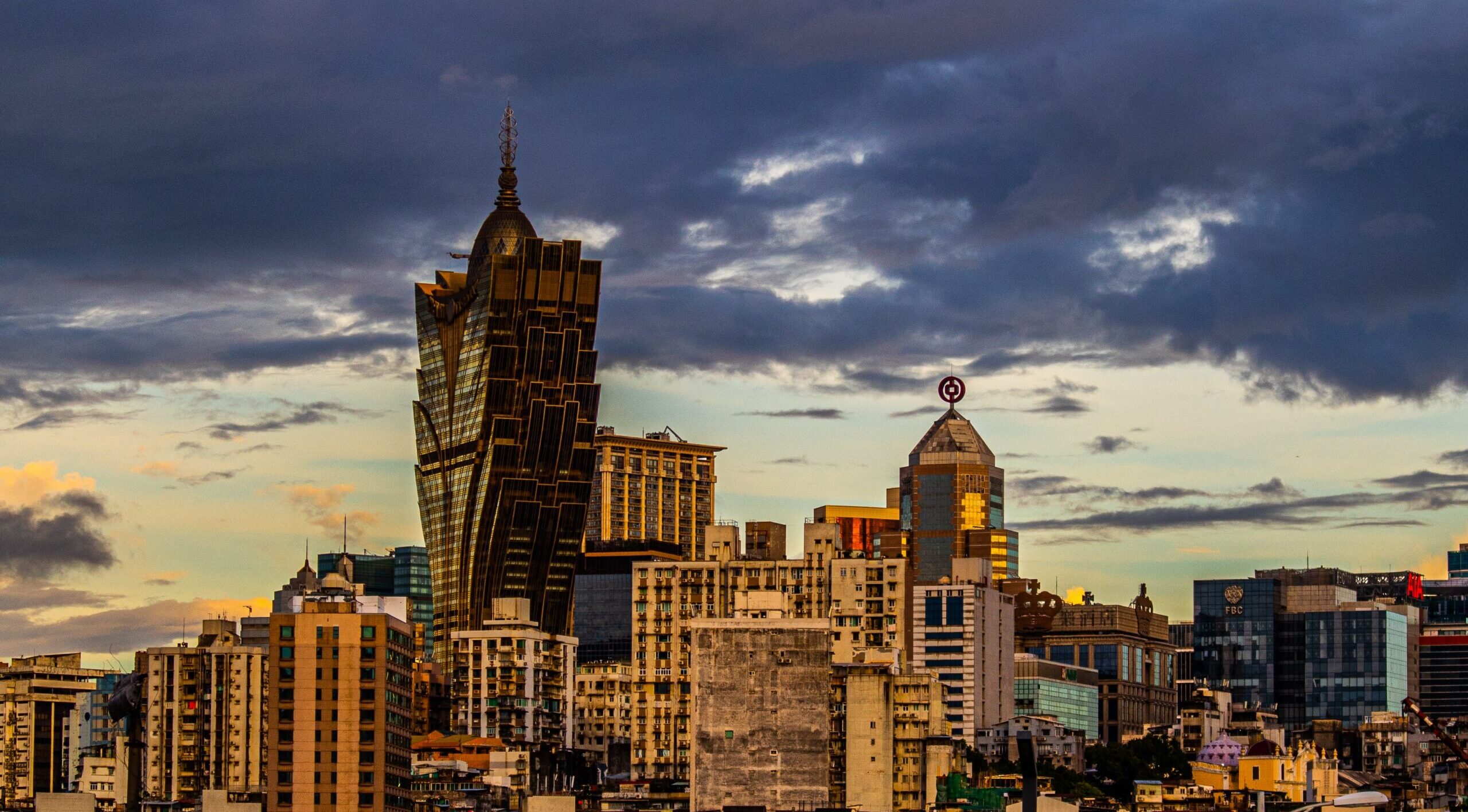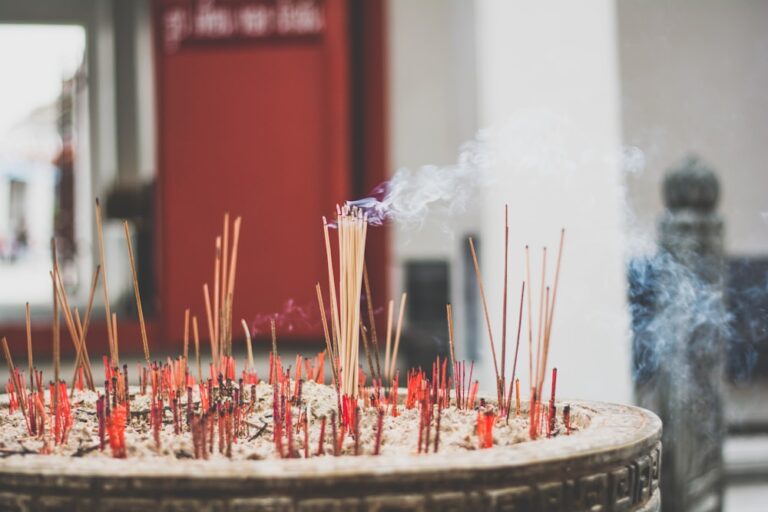Macau is a Special Administrative Region (SAR) situated in southern China. Macau remained under Portuguese rule for more than 400 years, and reverted to Chinese control in December 1999. Despite this, as an SAR, Macau retained Portuguese as its second official language alongside Mandarin.
Often referred to as the “Las Vegas of China,” Macau is renowned for its abundant luxury hotels and casinos. In 2022, the SAR boasted a GDP of USD 21.9 billion, of which around 25% came from the gaming market. However, Macau aspires to shed its singular gambling-focused reputation, emphasizing its diverse offerings beyond the gaming sector.
Download our China luxury market report
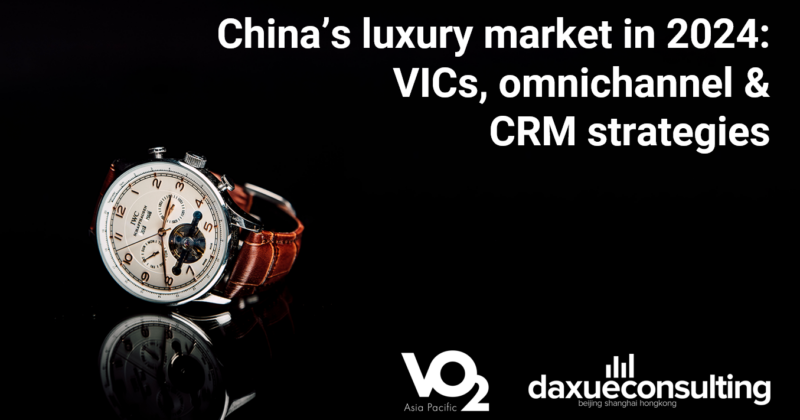
The origin behind the label “Las Vegas of China”
In 2022, the gambling market represented one of the biggest sectors in Macau’s economy, accounting for more than MOP 42 billion (USD 5.2 billion) of its total GDP. The SAR gained the name “Las Vegas of China” in the early 2000s, when the government allowed two gaming concessions and one sub-concession to US gaming companies in 2002. Since then, the country’s investments in hotels and Casinos on the Macanese soil increased rapidly. As of 2022, the business was so lucrative that the government collected more than USD 2.4 billion in gaming tax revenue. After having opened to gambling businesses, Macau allowed the American company “Las Vegas Sands” to build the Venetian Macao Casino, which is currently the biggest Casino in the world. The complex was opened in 2007 and costed approximately USD 2.4 billion. The idea of a Venice-inspired Casino reflected the American company’s objective of building a Macanese replica of their already existent building in Las Vegas, called the “Venetian Resort”.
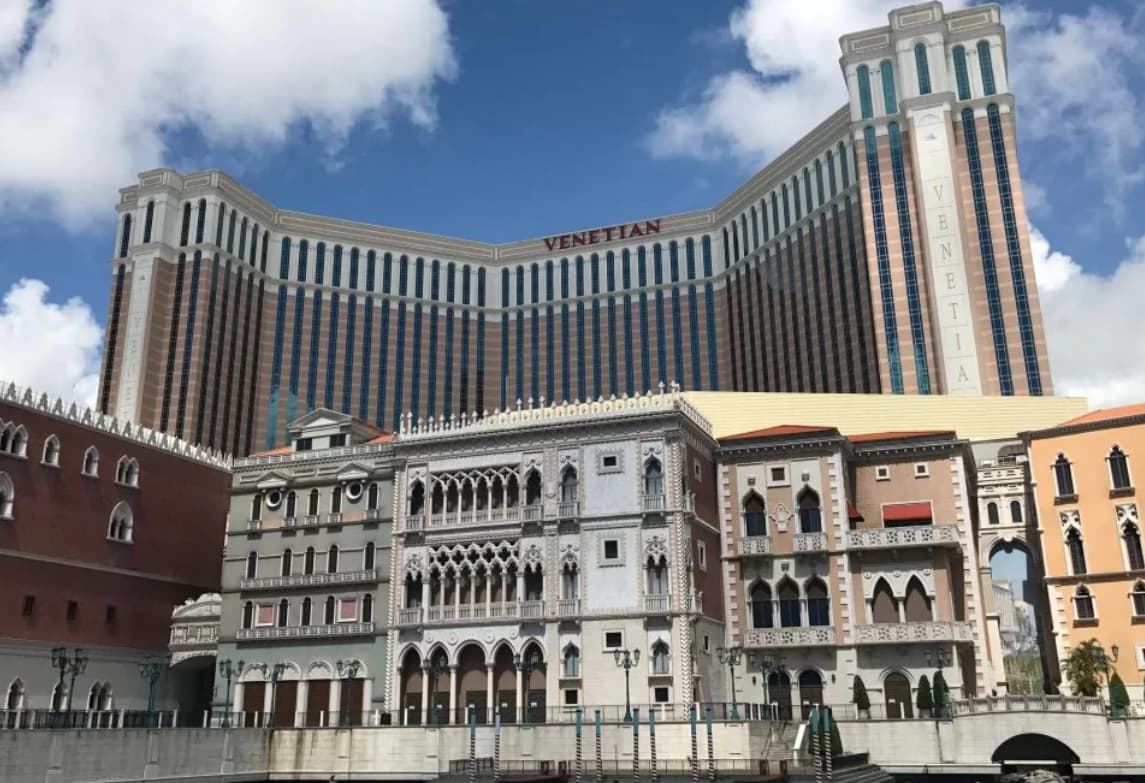
Despite this market sector being very profitable, the trend is starting to reverse. The government of the Special Administrative Region doesn’t want gambling to be biggest pillar of Macau’s economy anymore. As a result, in 2022, the gaming industry “only” represented around 25% of the total country’s GDP, compared to more than 50% during the pre-pandemic period.
Macau’s economy beyond gambling: boosting luxury, high-tech and more
Since 2022, the government of Macau and several gaming companies have embarked on a mission to diversify the SAR’s economy, aiming to reduce its reliance on gambling. To boost tourism, Macau introduced a “one-plus-four” economic development plan in 2022, targeting multiple sectors such as culture, health, finance, and science and technology. With nearly 90% of tourists originating from Mainland China, the government is implementing measures to attract more mainland Chinese visitors to Macau. As an example, since 2020, the Macao Government Tourism Office launched the “buy one, get one free” offer on round-trip tickets purchased with Air Macau from Mainland China. Not only the government, but also many companies are trying to boost Macau’s economy by promoting different activities other than gambling. At the beginning of 2023, six major casino agencies agreed to invest more than MOP 108 billion (USD 13.4 billion) over the next decade into boosting overseas sales and also promote non-gaming projects such as sports events, exhibitions, healthcare, and amusements.
The luxury market is healing after the pandemic: from hotels to fine cuisine
Despite the fact that its economy is mainly based on gambling activities, Macau is also betting on luxury tourism and shopping. Since 2019, the autonomous region has signed many contracts with major hotel groups and luxury brands. As an example, in 2021, the works for the Grand Lisboa Palace were completed and the structure was inaugurated. Started in 2014, the project costed approximately USD 4.6 billion and consists in a great complex which includes luxury hotels, Casinos and shopping centers with over a hundred fashion and lifestyle brands, including Cartier and Dior.
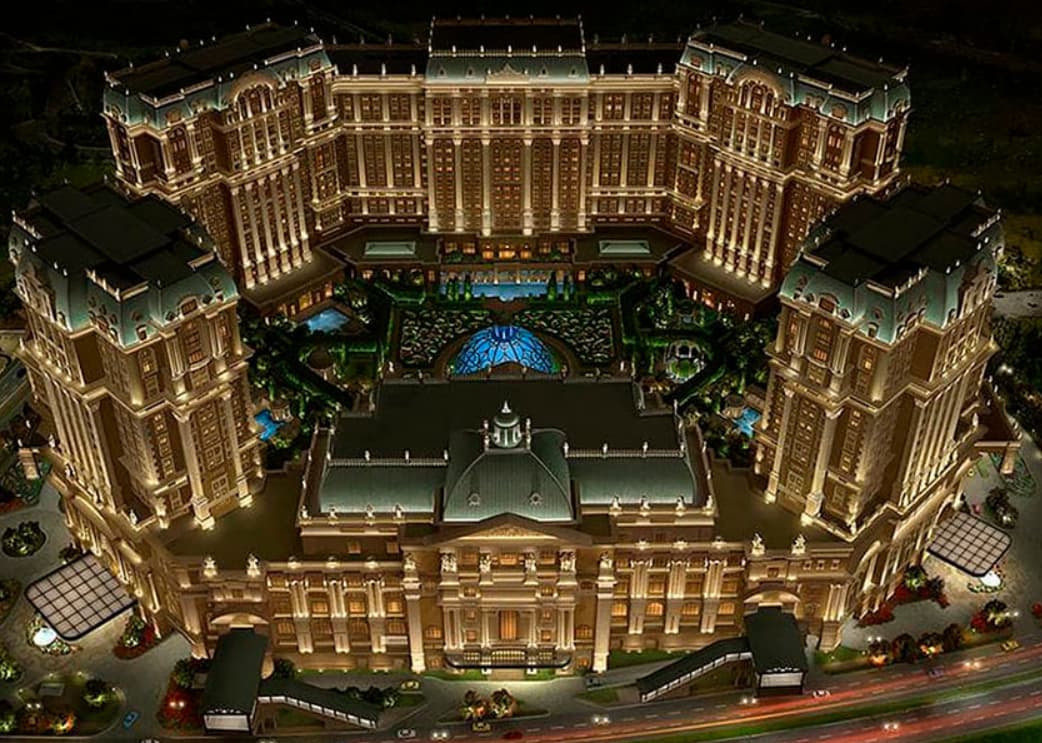
The fine cuisine also is an important element of the luxury market in Macau. Despite the huge losses suffered by the restaurant sector during the Covid-19 pandemic, since 2021, the business is starting to take off again. Combining a unique blend of Portuguese and Chinese cuisine, the restaurants in the SAR have gained popularity among Chinese consumers, captured by this exotic restaurant experience. In 2023, 16 Macanese restaurants obtained at least one Michelin star; whilst, in the same year, 6 others have been awarded with the “Bib Gourmand” title, another label that the Michelin Guide gives to restaurants which managed to combine excellent quality and reasonable prices.
Becoming a high-tech and elderly wellness hub are other objectives of the “new” Macau’s economy
Other than pushing luxury and fine cuisine, Macau is also aiming to establish an innovation and technology hub to boost the economy of the region. In 2021, the Economic and Technological Development Bureau was completely renewed with the creation of a Technology Department to facilitate the industrialization of scientific research achievements. Furthermore, since 2004, Macau instituted the Science and Technology Development Fund (FDTC), which was amended in 2021. The FDTC’s main objective is providing funds for innovations which can facilitate the technological development of the SAR, such as projects to enhance companies’ productivity, R&D in favor of industrial development, and promotion of technological cooperation.
Infrastructures are also an important matter for Macau. In November 2022, the region completed the extension of the Light Rail Transit (LRT) on the eastern line of the region. The project was in collaboration with the central government and provided a better transport system for both tourists and locals who need to move from Macau’s borders to the Qing Mao port.
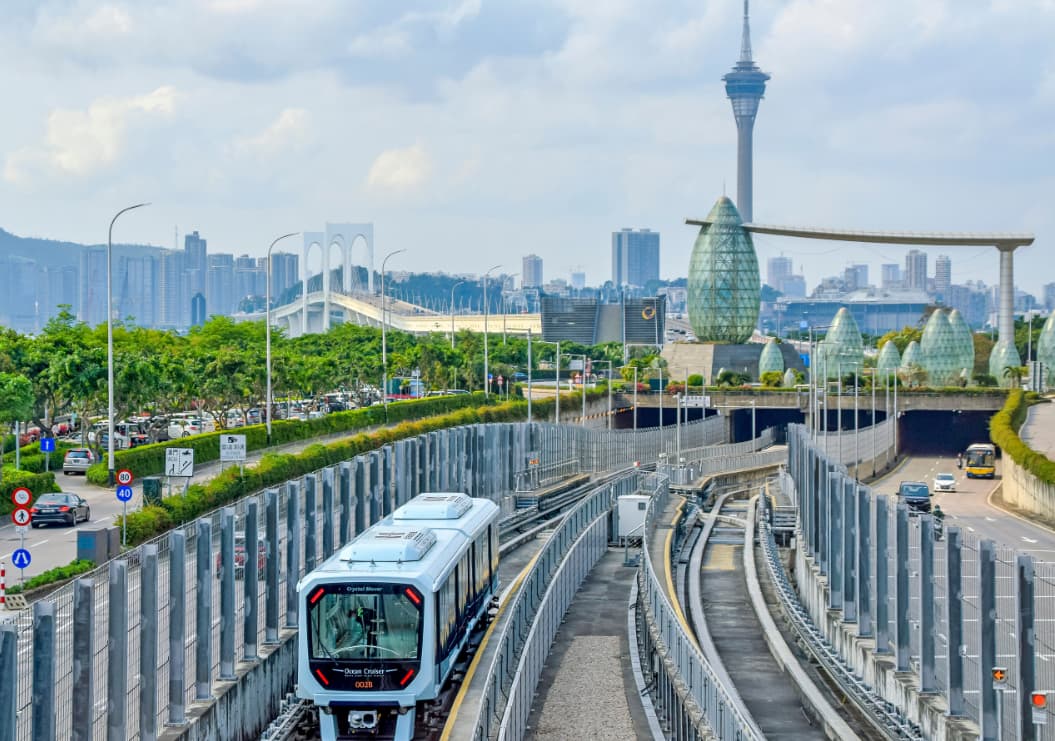
Moreover, Macau is also investing in private healthcare. The public medical care system is already free for Macau residents and provides a 24h service; however, two out of the 3 biggest hospitals in the region are private, and the government has announced many long-term projects to enhance the private healthcare system on the SAR so that they can attract more tourists from mainland China. In 2016, the government also announced the “Ten Year Action Plan for Elderly Services”, consisting not only in providing private medical assistance specifically for elderly people, but also following them in every aspect of the every day’s life, such as daycare centers and programs for elderly technology applications.
Macau challenges Hong Kong and Singapore in attracting luxury shoppers
The comparison between Macau and Hong Kong reveals similarities in their histories, both having gained independence from foreign rule—Macau from Portugal and Hong Kong from the UK, during the 1997 handover. In 2022, Hong Kong’s GDP, exceeding USD 359 billion, stands substantially higher than Macau’s, presenting it as a major economic player. A notable distinction lies in Hong Kong’s low taxation structure. Moreover, their trading dynamics differ, with Hong Kong’s primary partner being mainland China, while Macau relies significantly on Hong Kong, constituting over 84% of its exports in 2022.
Traditionally, Hong Kong has been a prominent luxury hub for Chinese tourists, but since 2020, a shift has been observed, with more consumers preferring Macau. Protests in Hong Kong not only discouraged mainland luxury shoppers from visiting the city but also contributed to an unpatriotic view of Hong Kong. In contrast, Macau assumed a more Beijing-friendly and welcoming stance, resulting in faster development in recent years.
Singapore is another competitor of the two SARs. Situated in the southern part of the Malay Peninsula, the city-state boasted an impressive GDP of USD 466 billion in 2022. Singapore’s economy shares similarities with Hong Kong, particularly in their specialization in global trade and financial hub status. Singapore has emerged as a significant global center for various industries, including petrochemical, electronic, and pharmaceutical. Despite the challenges, Macau maintains the highest influx of Chinese tourists, reaching 4.73 billion in 2023. One key factor contributing to Macau’s popularity among Mainland tourists is its cost of living, which averages 30% less than Hong Kong and 46% less than Singapore.
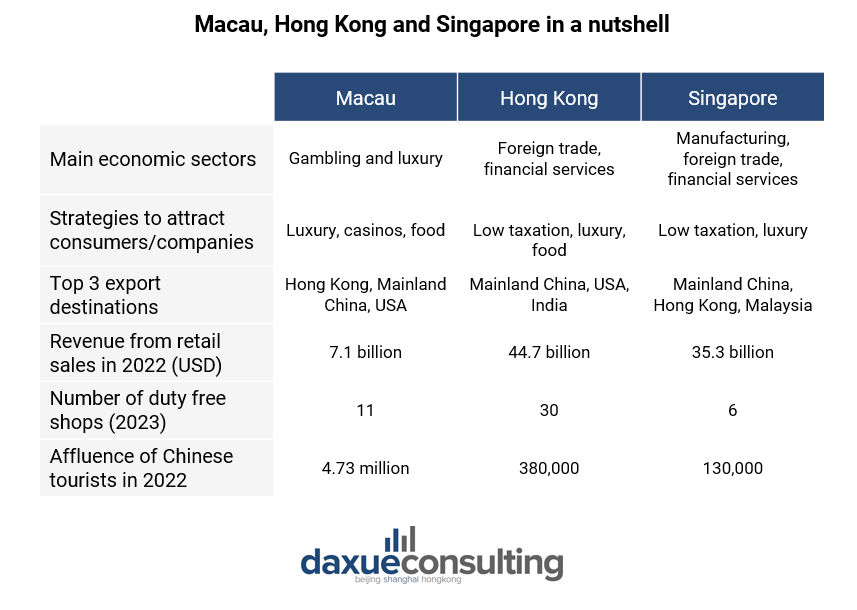
Macau’s economic makeover: A beacon of progress beyond the casino floors
- Macau is actively shifting away from its gambling-centric economy, with government and casinos initiatives aiming to diversify economic sectors beyond gambling.
- Investments in luxury tourism, exemplified by projects like the Grand Lisboa Palace, underscore the Chinese SAR’s commitment to attracting high-end tourists and shoppers.
- Macau’s fine cuisine, combining Portuguese and Chinese influences, is a key attraction, evident in the numerous Michelin-starred restaurants and culinary accolades.
- The former Portuguese exclave seeks to position itself as an innovation and technology hub, implementing measures like the creation of a Technology Department and investing in scientific research.
- Macau is investing in private healthcare projects and a comprehensive “Ten Year Action Plan for Elderly Services,” aiming to provide holistic care for elderly residents and attract elderly tourists.
- Despite Hong Kong traditionally being a luxury hub, recent shifts in consumer preference have seen Macau, with its more Beijing-friendly approach and strategic reopening during the Covid era, outpace Hong Kong in attracting Chinese tourists, while Singapore, though economically robust, faces stiff competition due to Macau’s allure, particularly its lower cost of living.


